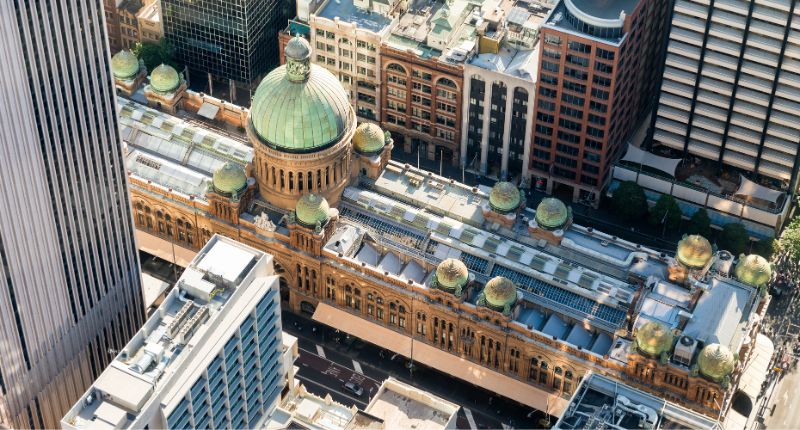
- CBD retail markets globally show varied recovery, with Sydney's luxury sector attracting attention and investment.
- London anticipates recovery in 2024, while Tokyo and Shanghai face challenges in retail investment.
- Global trends highlight shifts in consumer strategies, with sustainability, street retail, and unique experiences emerging.
CBD retail leasing markets are beginning to recover after being set back by the COVID-19 pandemic, but a dearth of transactions remains consistent across markets, according to JLL’s latest data.
Low transactions across the board
JLL Australia’s senior director of retail investments, Nick Willis, said that the capital for Sydney’s CBD retail was concentrated on core high-street luxury retail or assets with repositioning or development potential. Pricing remained uncertain, with the number of trades at all-time lows.
“Sales volumes in the nine months to Q3 2023 totalled only AUD$194.1 million, 58% below the historical 10-year average. There is significant pent-up capital demand for core Sydney CBD retail, and we expect investment volumes and offerings to increase in 2024,” he said.
“With limited transactions, the capital that has been participating is from high-net-worth private investors with increased inquiry from offshore and opportunistic capital looking at countercyclical plays.”
Likewise, JLL’s London team witnessed a marked transaction slowdown caused by rising interest rates. Still, quality assets were trading, although at a 55% turnover reduction to the 10-year average in the second quarter of 2023.
Investors in New York have opted to hold off on investing and wait out the rising interest rate cycle. There, private buyers account for 75% of the market’s activity.
Similarly, Tokyo and Shanghai’s CBD investments have largely stagnated. Sales volumes were 34% under the pre-pandemic benchmark of Q2 2019 in Japan’s capital, and no core retail transactions occurred over the last three years in Shanghai.
“Retail investment activity has been slow over the last three years, especially given the continuous impact of online shopping, Covid and more recently, youth unemployment. Institutional investors have generally overlooked retail assets because the financial aspects do not make acquisition feasible,” said JLL China’s head of capital markets, Eric Pang.
“It is difficult to see a significant rise in retail asset valuation in the short term.”
Eric Pang, JLL China’s Head of Capital Markets
Return to the office impacting markets differently
Internationally, leasing markets have shown signs of heightened activity, with distinct influences in each CBD. Additionally, the global return to work trend has had different impacts across the board.
“What we’re seeing in the Sydney CBD leasing market is a distinct rise in leisure and dining activities – led by a reduced work week in the CBD leading to increased evening and weekend activity,” said JLL senior research director, Andrew Quillfeldt.
“This has been mainly supported by a return to offices in the Sydney CBD along with a rebound in tourism and daily visitors,” he said.
A comparable trend has arisen in London, where occupancy rates rose to 53% in May 2023. However, Transport for London data reported that main station arrivals were 75% of pre-pandemic levels.
Office occupancy has been relatively high in New York compared to the national average, while its retail activity fell short of other national benchmarks.
In Tokyo, office attendance was nearing a full recovery, while retail activity was climbing in core markets. However, in Shanghai, the high office occupancy levels have not contributed to more consumer activity.
Luxury and apparel a key focus in Sydney
Willis noted that the luxury and apparel sector has attracted substantial attention in Sydney’s retail market.
“We have seen a noticeable rise in global luxury retail concepts in Sydney as it reaches a global level with other major markets. Most recently, Ralph Lauren opened its first World of Ralph Lauren store that follows on from brands such as Valentino, Dolce & Gabbana, Missoni, Brunello Cucinelli and Cartier opening flagship stores in 2022,” he said.
“We are also seeing heightened investment into store fit-outs to bring them in line with global market leaders, and this will continue as CBD retail strives to be a leading innovator for the broader retail market in Australia.
“We expect experiential retail, mainly pop-ups and in-store experiences, will continue to drive foot traffic and the uniqueness in our CBD retail markets versus the other sub-sectors.”
Fresh approaches to attract consumers
Though the global markets were experiencing a decline in consumer expenditures, they were working on other ways to revitalise consumer interest.
In London, CBD locations have tended towards offering sustainability and a well-being-driven personal experience. Meanwhile, New York, suffering from a surplus of retail space, focused on street retail.
On the other hand, Tokyo, which has experienced a surge from inbound tourism, was left with few retail vacancies and a recovery exceeding expectations. Shanghai pivoted to urban regeneration, with land remaining scarce and core retail locations beginning to reap the benefits of the upgrades.
Major CBD retail market outlook
Investment activity in Sydney is forecasted to grow over the coming 24 months. In London, 40% of the investors surveyed in UK Capital Markets Review & Outlook – 2022/2023 predict liquidity will recover in the first half of 2024, while 45% anticipate the market will turn around in the second half of 2024.
Investors in New York will be waiting for interest rates to abate, while in Tokyo, the banks’ conservative stance on retail investment loans has deterred investors from entering the market.
In Shanghai, the policy allowing for retail Real Estate Investment Trusts (REITs) may stimulate investments. Nonetheless, e-commerce and weakened consumer demand continue to impact the retail environment.







